There would be interactions with some of the classic great artists from the R & B realm – think Aretha, Etta, King Curtis, B. B. King, Jerry Butler, Big Mama Thornton, Otis Redding, Carla Thomas. There would be a quasi-apprenticeship with Jerry Wexler, the perceptive originator of the term “rhythm and blues”. Attending at sessions run by Wexler in Muscle Shoals, Miami and New York. And even a relationship with John Lennon, whose band The Beatles had so horrified Yorke with their insipid cover versions of classic R & B hits which had been denied exposure Down Under. But became household favourites as staple repertoire of The Beatles. And the chance of being the first media person to predict the massive North American success of Led Zeppelin, Yes and Dire Straits.
RITCHIE YORKE &
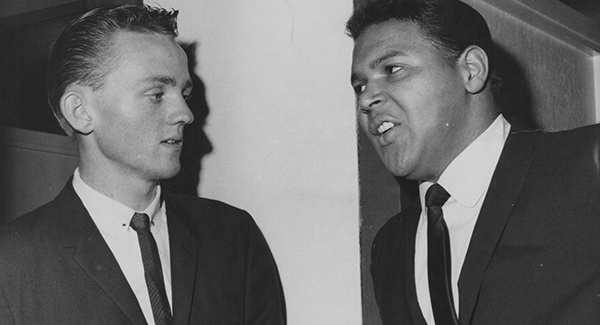
CHUBBY CHECKER
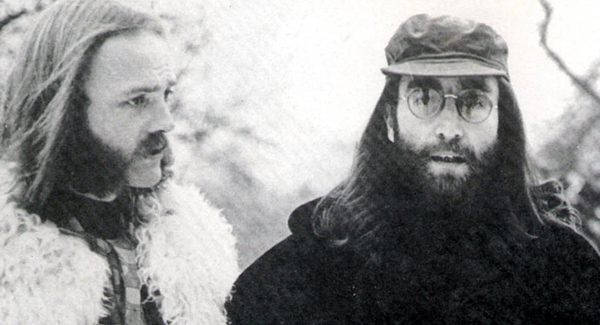
JOHN LENNON
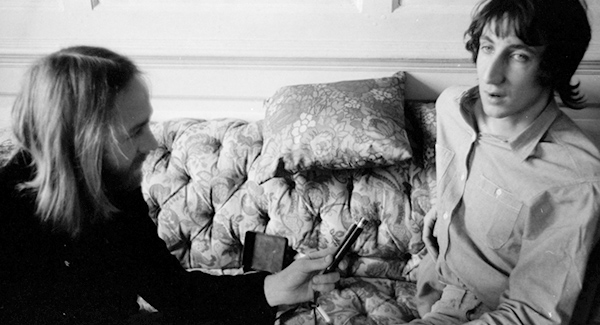
PETE TOWNSHEND
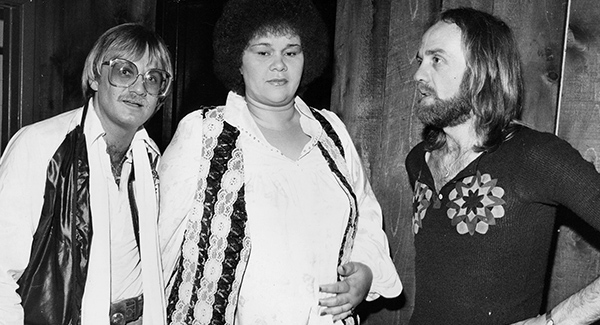
ETTA JAMES
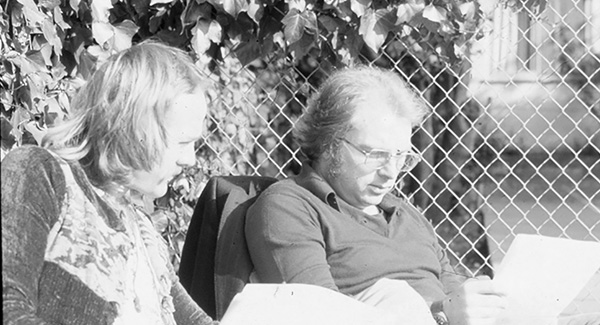
VAN MORRISON
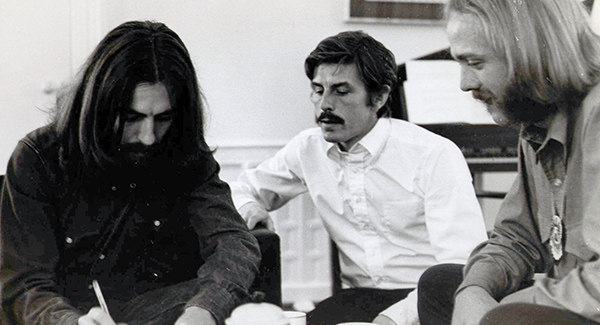
GEORGE HARRISON
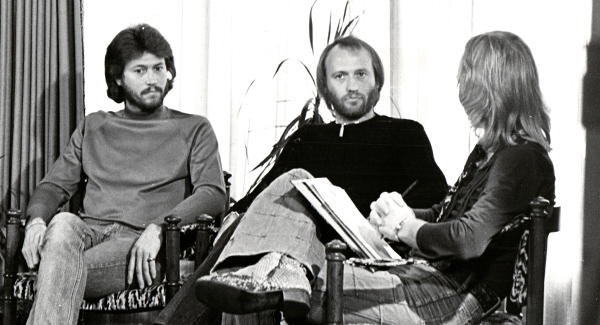
THE BEE GEES
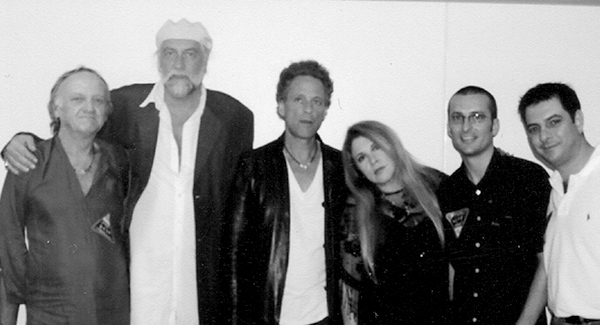
FLEETWOOD MAC
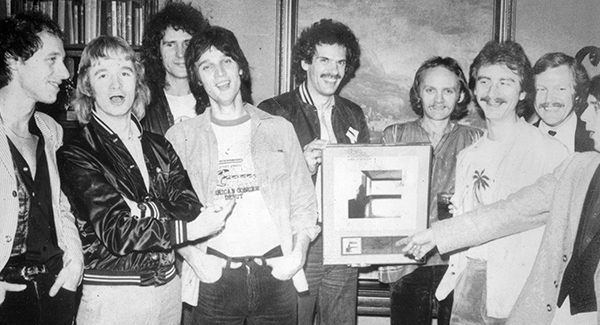
DIRE STRAITS
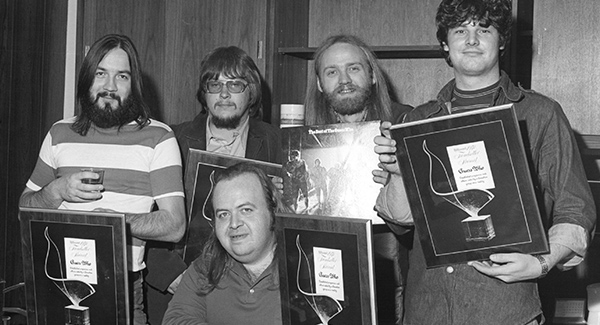
THE GUESS WHO
But firstly the young journalist had to serve his dues on the all-white home front. After writing local football reports for local papers, Yorke secured a weekly music column (Teen Topics) in the statewide edition of TV Week magazine. He also began an international correspondence with record labels, artists, music publishers et al. Early friends included members of the Beach Boys and their father Murry Wilson, the head of Sea-of-Tunes publishing, and father of Brian, Carl and Dennis, and uncle of Mike Love. When the boys turned up for their first Australian tour in 1963, Yorke was there to greet them and show them the local sights.
He worked for local radio stations before securing a position with a rural radio station in Tamworth New South Wales. Weekdays he wrote ad copy for the station, and then on Saturday night, he hosted a weekly rock `n’ roll party program which quickly gained an ardent following. Having been granted a place on Motown Records’ mailing list out of Detroit, he was able to offer listeners hot new R & B releases.
Among them was Fingertips Pt 2 by Little Stevie Wonder, an historic track by any definition as it marked the first time that an artist had achieved a number one single and album charting on Billboard (entitled The 12 Year old Genius Live) in the rock era. Yorke played Fingertips but was told by the station’s programmers that they didn’t want this style of music to be broadcast.
Yorke felt it was an appropriate time to draw a line in the sand with his own fingertips. And so he went back into the studio the following weekend and played Fingertips – again and again. It spun around eight times before the station program manager arrived at the studio and locked Yorke out.
There would be other programming problems at other radio stations. Until finally Yorke took one last whiparound the eastern seaboard radio markets and offered his DJ talents and his R & B-esque music preferences. Unfortunately nothing clicked and he retired back to his hometown, taking a traditional gig as a copywriter at a radio station owned by a left-of-centre political party. And plotted his next move. And the beginning of his odyssey.
A plan began to unfold in the months ahead as Yorke arranged to get married and head overseas, looking for the birthplace of rhythm and blues. There would be a five-week sea journey to the U.K. stopping in Colombo, Aden, Port Suez, Naples and finally Southampton.
In the months leading up to departure, Yorke worked at establishing links with Normie Rowe, Australia’s foremost singer in the pop world, and his manager Ivan Dayman. Sailing out of Sydney, Yorke took with him a suitcase full of Normie Rowe publicity, sufficient ammunition to track down an agent, publicist and record company to fuel Normie’s overseas career.
Initially Yorke functioned as International Promotions Manager of Sunshine Records. He convinced Polydor to sign Normie and then – after conducting an intensive search among London music publishers – discovered a powerful ballad penned by Barry Mann and Cynthia Weill (the composers of You’ve Lost That Loving Feeling for the Righteous Brothers) to serve as an early singles release under its title of It’s Not Easy.
A major career direction disagreement which saw Normie withdrawn back to Australia to bolster concert coffers for manager Ivan Dayman when U.K. success loomed, resulted in Yorke moving on and joining the team at Island Records. He toiled in the publicity department promoting two Spencer Davis Group singles – Gimme Some Loving and I’m a Man – to the international marketplace. Yorke also found time to publish his first book, Lowdown on the English Pop Scene (Horwitz Publications, 1966), with a foreword by Spencer Davis.
Turning down an offer from Island’s Chris Blackwell to manage singer Steve Winwood’s new avant garde rock band Traffic, Yorke emigrated to Toronto, Canada in mid 1967. He was still determined to get back to the spiritual home of rhythm and blues music.
It took awhile for Yorke to gain a foothold in the Canadian music scene which was controlled by forces from the south. Eventually he was able to break through and secure a contributing nod at the Toronto Telegram after penning an obituary for Beatles’ manager Brian Epstein. The 32-year old manager died August 27 1967 from an overdose of prescription sleeping pills.
So Yorke was able to parlay a nodding acquaintance from London into his Canadian media entree. It would be a notable breakthrough as Yorke began to map out an ever-widening audience for his writing. Firstly in the Toronto Telegram, but then a flock of other dailies including the L.A. Times, Chicago Daily News, Boston Globe, Houston Post, Detroit Free Press, Rochester Democrat, Ottawa Journal, Winnipeg Free Press, Saskatoon Star-Phoenix, L. A. Free Press, and music magazines of the order of Circus, Jazz and Pop, Fusion and Zoo World. Several US syndicates followed.
Important connections were struck as Canadian editor for the international music trade weekly, Billboard magazine. And a similar position with Rolling Stone magazine, the new alt-journal for music out of San Francisco.
In the broadcasting world, Yorke was given an on air dee jay shift on CHUM FM, Toronto’s first FM rock station. He was also the resident emcee at Toronto’s live rock headquarters, the Rock Pile club, where he introduced a plethora of legendary acts, from MuddyWaters through Led Zeppelin, from Howlin Wolf to Blood Sweat & Tears, from Jimi Hendrix to Iron Butterfly. And scores of other top liners.
A special peak was arrived at in late’68 when Yorke began a long and often intense relationship with John and Yoko Lennon. He and the Lennons had struck up a warm friendship over chats with the peace-loving couple at Apple Corps in Savile Row. Yorke was profoundly impressed with the Lennon’s pioneering efforts to use music as an instrument of social change. Such an force has long been an aspiration of Yorke’s.
With the rapidly disintegrating Vietnam War as a backdrop, the planet was clearly needing some form of change at that point in time. Canada would play a central role in that movement. Yorke was involved with the Lennon’s three key Canadian-based events in 1969. Firstly there was John and Yoko’s celebrated Bed In for Peace in Montreal in May, 1969. Later that summer, Yorke played a key role in what Rolling Stone magazine has called the second most important event in rock history – John Lennon’s historic first live performance outside the Beatles at the Toronto Rock `n’ Roll Revival in September 1969. It had been four years since John had performed beyond the parameters of The Beatles.
Yorke assisted in bringing the Lennons back to Canada in December 1969 to unveil their historic War Is Over If You Want It peace campaign, and to meet with communications prophet Marshall McLuhan and Prime Minister Pierre Trudeau. During their Canadian stay, Yorke was given an ultimatum. He was instructed to either quit his Globe and Mail columnist job to join the War Is Over If You Want It peace campaign, or get back to toiling at the Globe. Some choice! His editor told him that he couldn’t work for John Lennon and the Globe at the same time and that he had to make a choice between them. It took him about a sixth of a second to decide!’’ mused a colleague.
As 1969 crossed over into 1970, Yorke found himself stuck in the middle of a world in change. Yorke was passionately caught up in the cause. He travelled around the planet selling the gospel of peace on the Lennons’ behalf in early l970 (he and travel buddy, rockabilly legend Rompin’ Ronnie Hawkins thundered through 15 countries and 52,000 miles in five weeks). They were all over the front pages of Hong Kong tabloids in late January – seizing headlines when he and the Hawk risked their lives illegally crossing into Red China to present the War Is Over message to the Communist Chinese at Lok-ma-Chau.
The War Is Over battle exploits are detailed in more substantial terms in Yorke’s account of that era. “Christ You Know It Ain’t Easy- John and Yoko Lennon’s Battle for Peace” is the working title of the Australian journalist’s memoir – it’s being published mid-way through 2015.
In the late ‘60s, Yorke became closely identified with the emerging nationalism of Canadian music. He was a public advocate of Canadian content legislation which led to the formation of a domestic music production scene. Yorke was in the forefront of a group of Cancon supporters which eventually brought about a radical and revolutionary change in the structure of the Maple music industry. He was widely identified as an ardent believer in Canadian talent and ultimately would be described by Canadian Composer magazine as “the patron saint of Canadian music.’’
Yorke’s first full-length book AXES CHOPS & HOT LICKS (THE CANADIAN ROCK MUSIC SCENE) (published by Hurtig, 1971) was the initial documentation of the burgeoning Maple Music scene. Later Yorke was instrumental (with the editor of New Musical Express, the late Andy Gray) in the instigation and organization of the Maple Music Junket, an historic federal government and industry-supported initiative to bring one hundred members of Britain and Europe’s key music media to Canada to witness the local talent explosion in action.
In 1972, he was named Canadian Journalist of the Year at the Juno Music Awards in Toronto. In the words of Canadian Musician feature writer, Tom O’Connor, Yorke – “One of the gutsiest foot soldiers in the battle for Canadian musicians to be heard in their own country, wasn’t even Canadian. He was a gregarious Aussie with the ever present blond moustache, the dean of Canadian rock writers for 19 years.’’ (March 1987).
In the view of David Farrell, publisher of Canada’s then foremost music trade weekly, The Record, Yorke’s “energy, enthusiasm and charisma have touched many people in this country, whipping up support for too many projects to begin counting out, but it is fair comment to say that his participation and involvement in the Canadian music industry has been acknowledged from coast-to-coast and left an indelible imprint that has and will benefit musicians for many, many years to come.’’
There were also several magazine involvements in Toronto in the early ‘70s, the most notable being Rainbow magazine which survived 14 editions before being silenced by financial restraints. There was also Grapevine and Pop magazines.
In 1973, Yorke cut back on his everyday assorted freelance writing and broadcasting activities to focus on the book field which he felt was ripe for quality product. He moved back to London to respond to an invitation from manager Peter Grant to write the sanctioned biography of the foremost band of the ‘70s, Led Zeppelin.
Yorke had in fact been the first media person to publicly predict the astonishing North American success of Zep, at a time when most critics were panning them for being overly bombastic and pretentious. That forecast took place in January 1969 and for the next five years, Yorke maintained an extremely tight relationship with the reclusive Zep members. He accompanied them on tour as their special guest and wrote more words about the band than any journalist anywhere. As singer Robert Plant has noted: “Ritchie’s alright… he’s been one of us from the beginning.’’
Or in the summarising 2012 words of John Paul Jones: “Ritchie was our champion.”
After completing THE LED ZEPPELIN BIOGRAPHY (which has subsequently sold over 250,000 copies in various languages and has just been published as an ebook), Yorke moved to Wengen, Switzerland to write a book biography of the celebrated Irish singer/songwriter Van Morrison.
INTO THE MUSIC (THE VAN MORRISON BIOGRAPHY) was published in Europe in 1975, and New Musical Express described it as: “a balanced and praiseworthy account of Van Morrison and his career to date.’’ By then Ritchie Yorke and Annette Carter had been blessed with two children, Samantha and Chris (born 1971 and 1974 respectively). Yorke also served on the Committee of Honour at the 8th International Montreux International Jazz and Blues Festival.
In early 1975, Yorke was approached by Canada’s CHUM radio network (at that time the largest private broadcasting network in the world) to research and write an in-depth history of the rise of the rock `n’ roll culture. More than a year in production, the 64-hour rockumentary entitled The Evolution of Rock (The Music That Made the World Turn ‘Round) was widely syndicated throughout the world, including Australia. It would ultimately be heard by over 50-million rock fans and won Billboard magazine’s prestigious Documentary of the Year award.
To coincide with the international airing of the radio series, Yorke published the acclaimed companion book THE HISTORY OF ROCK `N’ ROLL. In 1977, he also travelled to Los Angeles to assist Van Morrison (as his official publicist) in the launching of his A Period of Transition album, which had been co-produced by Dr John (Mac Rebennack).
After the tragic death of John Lennon in late 1980, Yorke – as a confidante of the former Beatle – was besieged by world media for comments on John’s philosophy and general anti-war agenda.
The day after John‘s death, Yorke ploughed through 100ks of a raging blizzard to reach a Toronto studio, appearing on a national network morning TV show to discuss Lennon’s special connection with Canada.
He was a key contributor to the Rolling Stone-sanctioned book, The Ballad of John and Yoko (Doubleday 1982). He was also appointed media spokesman for Lennon’s Bag One lithograph exhibition which toured the US in 1983.
Between 1977 and 1986, Yorke hosted a high-rating weekly radio rock magazine show, initially on Q107 Toronto and then on FM108 Burlington. The Panasonic/Technics sponsored program Night Moves achieved significant weekend ratings.
In the autumn of 1986, Yorke shocked the Canadian music industry by announcing that he intended to return to his Australian homeland with his Canadian wife, Christine Ditchburn and their two young children, Ian and Emily (born 1981 and 1983 respectively). It would be farewell to two decades of culture-changing activities in the North country.
His departure prompted Canada’s leading music biz commentator David Farrell to write: “Yorke needs a new crusade to lead. He’s gone as far as he can in Canada. The Canadian recording industry is a thousand light years from what it was when Ritchie got here (in 1967) and he has had an incredible amount to do with it.’’
Back on the sub-tropical soil of his Brisbane birthplace, Ritchie did not seek out nor find a new crusade to lead. But he did summon up sufficient written support for Brisbane’s rock music scene that it helped the city to believe in itself and to explode creatively in the later ‘90s.
Yorke linked up with the mass market weekend newspaper The Sunday Mail and began contributing to its entertainment pages on Queensland Day (June 6) 1987. Thousands of rock profiles and interviews later, he moved back to freelance writing after 20 years at the Mail. And left behind his descriptive phrase about local talent – Briz-bands.
He also became involved with ABC Radio both as a presenter and program producer. There was a syndicated documentary series, Classic Conversations with John Lennon, and an array of other docos on long term artists of significance such as Van Morrison, Pink Floyd, Little Feat, The Band, INXS, Daniel Lanois, Dire Straits, the Neville Brothers and many others.
He was also part of the opening broadcast of ABC’s Coast FM station in Mermaid Beach and co-hosted the morning show in its early weeks of existence.
In 1993, Yorke produced an updated edition of his Led Zeppelin bio for the Japanese and English language markets. And followed with a further update in 1999 on a respected title which continues to sell.
Yorke has maintained a close relationship and worked closely with Yoko Ono on a number of projects since John Lennon’s tragic death. He was a contributor to the Imagine multi-media project, to Yoko’s six-CD box set Onobox and more recently to Yoko’s widely-acclaimed 25th anniversary commemorative book, Memories of John (published by Harper Collins December 2005). Yorke was deeply honored to join a collection of distinguished author/contributors including Bono, James Brown, Jerry Lee Lewis, Sir Elton John, Sir Mick Jagger, Ray Charles, John Fogerty, Peter Gabriel, Pete Townshend and Alicia Keys. When an industry celebration of Yorke’s 45 years of writing about rock music took place in Brisbane in June 2007, Yoko sent congratulatory flowers.
A few months later, Yoko invited Yorke and his partner Minnie Cherry to attend the October 2007 inauguration of her Imagine Peace Tower project in Reykjavik, Iceland, on the occasion of what would have been John’s 67th birthday. Yorke wrote widely about the extraordinary experience and featured it in his new Lennon peace book.
In mid-2008, Yorke returned to his adopted homeland of Canada to research a number of special projects, and to begin writing several books including his memoirs. He penned the liner notes for a DVD re-issue of Sweet Toronto (D.A.Pennebaker’s documentary of John Lennon’s Rock `n’ Roll Revival appearance). There was a Yorke-penned Led Zeppelin cover story in Mojo magazine’s special 1969 issue (Feb. 2009). He provided the liner notes for the Australian release of Normie Rowe’s anthology, Necessarily So…The Normie Rowe Collection.
In 2014, a specially blended team of archivists set about preserving Yorke’s 50 years in the rock `n’ roll world. Thousands of articles and photographs were digitised. Discussions took place with several documentary makers and a spectacular new website (<ritchieyorke.com>) was launched.
A literary highlight of 2014 was the publication in Australasia of Rock Country, a hard-cover coffee table tome about the rock `n’ roll sub-culture written by a clutch of creditable contributors. Yorke’s yarn covered his Darling Downs experiences with Little Stevie Wonder’s Fingertips in 1963 through his historic involvement with Normie Rowe, Australia’s King of Pop.
